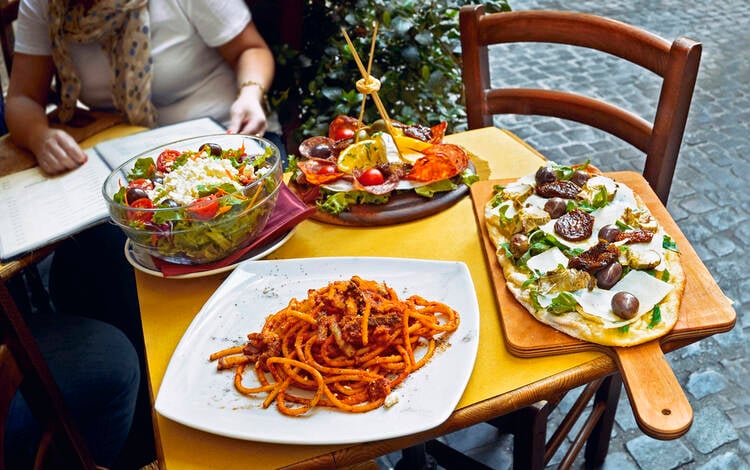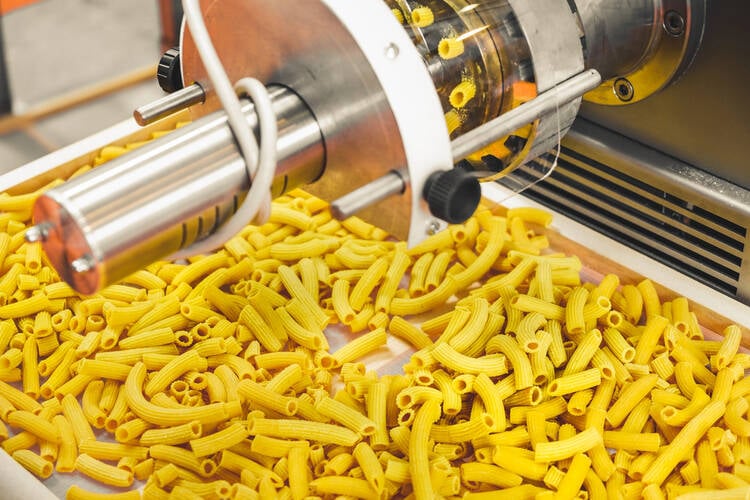
Starting a pasta business is a good way to launch a venture that offers consistent demand and broad market appeal.
Pasta is a staple in many households and restaurants, making it a reliable product with year-round consumption.
The good thing about a pasta business is that it allows for creativity and versatility.
You can experiment with different pasta shapes, flavors, and ingredients to cater to various dietary preferences, from traditional wheat-based pasta to gluten-free or plant-based options. This diversity can help you stand out and build a loyal customer base.
If you are interested in starting a pasta business and want to avoid stiff competition, you should consider exploring unique niches within the market.
For example, you could focus on artisanal handmade pasta, ready-to-cook pasta meal kits, or gourmet pasta infused with herbs and spices.
Offering something distinctive will set your brand apart and attract curious customers.
Best Pasta Business Ideas
-
Artisanal Handmade Pasta Shop
An artisanal handmade pasta shop focuses on creating fresh, high-quality pasta from scratch using traditional techniques and premium ingredients.
You can offer a variety of shapes like tagliatelle, ravioli, and gnocchi, appealing to customers seeking authentic Italian flavors. Highlighting local and organic ingredients can add a premium touch.
You can also offer take-home pasta packs, sauces, and host pasta-making workshops.
This personal, handcrafted approach sets your brand apart from mass-produced pasta brands and creates a loyal customer following.
-
Gluten-Free Pasta Brand
With more people adopting gluten-free diets, launching a gluten-free pasta brand can tap into a growing niche.
Use alternative flours like rice, chickpea, lentil, or quinoa to create pasta options for customers with celiac disease or gluten sensitivities. Offer a range of shapes and sizes to give variety.
Focus on branding your products as healthy and allergen-friendly while maintaining great taste and texture. Selling online or through health food stores can boost your reach.
Providing clear nutritional labeling and creative recipes will also build trust and encourage repeat purchases.
-
Gourmet Pasta Meal Kits
Gourmet pasta meal kits are perfect for busy people who want restaurant-quality meals at home.
Each kit can include fresh pasta, sauce, toppings, and instructions for quick assembly.
Highlighting premium ingredients like truffle oil, sun-dried tomatoes, or artisan cheeses can make your kits stand out.
Subscription options create recurring revenue and customer loyalty. You can also collaborate with local farms or specialty food producers for fresh ingredients.
-
Pasta Food Truck
A pasta food truck lets you bring freshly cooked pasta dishes directly to customers at events, markets, and busy city streets.
This mobile concept offers flexibility and lower startup costs than a full restaurant.
You can serve popular dishes like fettuccine Alfredo, spaghetti Bolognese, or penne arrabbiata, with daily specials to keep the menu exciting.
Adding sides like garlic bread or salads enhances the meal experience. Engaging branding, quick service, and flavorful offerings can make your truck a hit and attract long lines during lunch or dinner hours.

-
Vegan Pasta Line
A vegan pasta line can cater to the growing demand for plant-based options.
Offer egg-free fresh pasta and pair it with dairy-free sauces like cashew Alfredo, tomato-basil, or olive tapenade.
Use eco-friendly packaging and promote sustainable practices to attract conscious consumers.
You can sell through local health stores, farmers’ markets, or online platforms.
Offering sample packs or subscription boxes will encourage trials and repeat orders from customers looking for cruelty-free pasta alternatives.
-
Pasta Subscription Box
A pasta subscription box offers customers a curated selection of pasta and complementary items delivered monthly.
Each box could feature unique pasta shapes, specialty sauces, seasoning blends, and recipe cards.
Rotating themes such as “Italian Classics,” “Spicy Flavors,” or “Seasonal Harvest” keeps the experience exciting.
This model builds steady recurring income and brand loyalty. You can source from local pasta artisans or produce in-house.
Offering customization for dietary preferences like vegan or gluten-free adds inclusivity, while eye-catching packaging enhances the unboxing experience and social media appeal.
-
Pasta and Wine Pairing Bistro
Opening a pasta and wine pairing bistro offers a refined dining experience centered around perfectly matched pasta dishes and wines.
Each menu item can feature a signature handmade pasta paired with curated regional wines.
Hosting pairing events and tastings can attract food enthusiasts and elevate your brand’s image.
An intimate, cozy ambiance with knowledgeable staff enhances the customer experience.
This concept appeals to date nights, corporate dinners, and special occasions.
-
Pasta-Themed Café
A pasta-themed café creates a cozy, casual environment where customers can enjoy creative pasta-based meals.
Beyond traditional pasta plates, you can offer pasta salads, baked pasta casseroles, and pasta-based breakfast options like frittatas or pasta omelets.
Offering coffee, pastries, and pasta snacks can widen your menu appeal. Creative décor, such as pasta-themed art or hanging pasta displays, adds charm.
This type of café works well in urban areas or near college campuses, attracting both pasta enthusiasts and casual diners looking for a fun, relaxed place to eat.
-
Dried Gourmet Pasta Brand
Launching a dried gourmet pasta brand lets you produce shelf-stable pasta with unique shapes, flavors, and ingredients.
You can experiment with infused varieties like spinach, beetroot, squid ink, or saffron pasta to attract adventurous eaters.
Selling in premium packaging through specialty grocery stores, farmers’ markets, or online increases your reach.
Highlighting artisanal production methods and quality ingredients helps build a strong brand identity.
Offering gift boxes or holiday bundles also boosts seasonal sales. This scalable business allows for wide distribution and the ability to reach distant markets.
-
Pasta Catering Service
A pasta catering service can serve corporate events, weddings, and private parties with customizable pasta bars or buffet-style meals.
Offer a variety of pasta types, sauces, proteins, and toppings to let guests build their own plates.
Freshly prepared dishes and interactive serving stations make events memorable.
Providing themed packages like “Italian Night” or “Gourmet Truffle Experience” adds flair. This business benefits from high-profit margins during large events.
Building partnerships with event planners, venues, and wedding coordinators can help you secure consistent bookings.
-
Pasta Cooking Classes
Hosting pasta cooking classes lets you share your skills while earning revenue.
You can teach groups how to make fresh pasta from scratch, create sauces, and plate dishes beautifully.
Offer beginner-friendly sessions and advanced workshops for enthusiasts.
Providing recipe booklets and take-home pasta kits can boost income. You can hold classes in a rented kitchen, your shop, or even online for a broader reach.
-
Pasta-Based Frozen Meals
You can create ready-to-heat dishes like lasagna, baked ziti, or pasta primavera using high-quality ingredients.
Focus on balancing taste and nutrition while offering portion-controlled options for busy families or singles. Packaging should emphasize freshness and quick preparation.
Selling through supermarkets, online stores, or meal delivery apps expands your reach.
Seasonal limited-edition flavors or diet-specific lines like low-carb or plant-based options can keep your offerings fresh and appealing to diverse customer groups.
-
Pasta Pop-Up Restaurant
A pasta pop-up restaurant is a great way to test your concept with lower risk.
Set up temporary dining events in unique locations like rooftops, gardens, or art galleries, offering exclusive pasta tasting menus.
Pop-ups create buzz and urgency, attracting curious foodies and media attention.
You can partner with local chefs, artists, or musicians to enhance the experience.
Limited-time themes such as “Pasta and Jazz Night” or “Rustic Italian Feast” add excitement.
This model builds brand awareness and lets you experiment with dishes before committing to a permanent restaurant.
-
Kids’ Pasta Brand
A kids’ pasta brand focuses on fun shapes, colorful varieties, and healthy ingredients that appeal to children and parents alike.
You can fortify pasta with vegetables or protein to boost nutrition without sacrificing taste. Bright, playful packaging and kid-friendly characters enhance appeal.
Offering portion-controlled packs for lunchboxes or family dinners adds convenience.
Collaborating with schools, daycare centers, and pediatric nutritionists can strengthen your brand credibility.
Including collectible recipe cards or activity sheets encourages repeat purchases and creates an interactive mealtime experience for kids and families.
-
Organic Pasta Line

An organic pasta line targets health-conscious consumers who prefer clean, pesticide-free ingredients.
Using organic grains and natural coloring agents like beetroot or spinach helps you stand out.
Clearly labeling certifications and emphasizing sustainability will attract eco-minded buyers.
Selling through farmers’ markets, organic grocery stores, and online platforms increases your visibility.
You can also promote eco-friendly packaging and donate a portion of profits to environmental causes to strengthen your brand image.
-
Pasta and Sauce Combo Packs
Pasta and sauce combo packs offer a complete meal solution for busy customers.
You can pair your signature pasta with house-made sauces like pesto, marinara, or Alfredo in ready-to-cook sets. Highlighting locally sourced or seasonal ingredients will enhance appeal.
Attractive, resealable packaging adds convenience. These packs are perfect for supermarkets, gift baskets, or online delivery.
Including recipe suggestions or wine pairings on the label can make your brand stand out.
-
Specialty Pasta for Restaurants
Producing specialty pasta for restaurants lets you become a trusted supplier in the food service industry.
Offer custom shapes, flavors, or dietary-specific pasta (like gluten-free or vegan) tailored to each restaurant’s menu.
Consistency, freshness, and quality are crucial to building long-term partnerships.
You can start locally and scale regionally as demand grows. Providing reliable delivery schedules and competitive pricing can strengthen client relationships.
This B2B model offers steady revenue and opportunities to collaborate on exclusive signature dishes that highlight your pasta brand on restaurant menus.
-
Ethnic Fusion Pasta Line
An ethnic fusion pasta line combines traditional pasta with global flavors, appealing to adventurous eaters.
Think curry-flavored spaghetti, kimchi-filled ravioli, or taco-inspired pasta shells. This creative approach helps you stand out from typical Italian offerings.
Limited-edition seasonal flavors can create buzz and urgency. Selling online, at specialty grocery stores, or at food festivals can introduce your brand to diverse audiences.
Fusion pasta adds excitement to the market and sparks curiosity-driven purchases.
-
Pasta Gift Baskets
Pasta gift baskets are perfect for holidays, corporate gifts, or special occasions.
Each basket can include assorted gourmet pasta, sauces, seasonings, olive oil, and recipe cards.
Elegant packaging and customizable options make them appealing for both personal and business gifting.
You can create themed baskets like “Romantic Italian Night” or “Family Pasta Party.”
Offering nationwide shipping and bulk order discounts increases your reach. Seasonal or limited-edition collections can boost sales.
-
Pasta-Themed Cooking Studio
A pasta-themed cooking studio offers a space where people can cook, eat, and celebrate all things pasta.
You can host regular pasta-making workshops, private parties, or team-building events.
Include a retail corner selling pasta tools, ingredients, and your branded products.
Creating an Instagram-worthy interior encourages social sharing and free marketing.
You can also offer memberships or loyalty programs to encourage repeat visits.
This immersive, experiential approach creates a strong community around your brand and positions your studio as a go-to hub for pasta enthusiasts.
